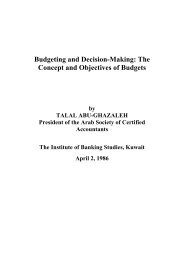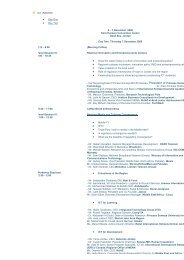Regional Workshop on the UNDP Evaluation Policy Arab States
Regional Workshop on the UNDP Evaluation Policy Arab States
Regional Workshop on the UNDP Evaluation Policy Arab States
Create successful ePaper yourself
Turn your PDF publications into a flip-book with our unique Google optimized e-Paper software.
Evaluati<strong>on</strong> should streng<strong>the</strong>n partnerships with governments and key stakeholders. It should<br />
build <strong>the</strong> capacity of nati<strong>on</strong>al instituti<strong>on</strong>s to implement, m<strong>on</strong>itor and evaluate.<br />
Key issues and implicati<strong>on</strong>s<br />
The c<strong>on</strong>cept of development evaluati<strong>on</strong> is relatively new in <strong>the</strong> regi<strong>on</strong> and is not widely applied.<br />
As a result, <strong>the</strong>re is a lack of understanding of what evaluati<strong>on</strong> means at <strong>the</strong> nati<strong>on</strong>al level and<br />
how to improve <strong>the</strong> capacity of nati<strong>on</strong>al evaluati<strong>on</strong>s systems to design, implement and use<br />
evaluati<strong>on</strong>s. The issues raised <strong>on</strong> capacity development related to both <strong>UNDP</strong> and nati<strong>on</strong>al<br />
systems.<br />
A range of issues were highlighted by <strong>UNDP</strong> staff through <strong>the</strong> discussi<strong>on</strong>s: (i) ensuring<br />
independence of evaluati<strong>on</strong> – in particular roles and resp<strong>on</strong>sibilities between those who manage<br />
and commissi<strong>on</strong> evaluati<strong>on</strong>s (e.g. <strong>UNDP</strong> COs, government agencies), those who have an interest<br />
in evaluati<strong>on</strong> results at a policy and programme level, as well as those who actually undertake<br />
evaluati<strong>on</strong>s, are not always clearly defined; (ii) problem of statistical data in terms of <strong>the</strong> quality<br />
and availability of data, partly compounded by <strong>the</strong> fact that data bases are produced by different<br />
agencies without sufficient coordinati<strong>on</strong>, which also reflect weakness in relati<strong>on</strong> to sensitive<br />
topics such as violence against women and human rights; (iii) need for a more effective<br />
m<strong>on</strong>itoring and evaluati<strong>on</strong> system in <strong>UNDP</strong> COs. Without clear indicators, a coherent m<strong>on</strong>itoring<br />
approach and a precise evaluati<strong>on</strong> plan, <strong>the</strong> identificati<strong>on</strong> of what to evaluate and <strong>the</strong> criteria for<br />
evaluati<strong>on</strong> becomes arbitary and subjective; (iv) high turnover of <strong>UNDP</strong> staff; (v) lack of<br />
financial and human resources and (vi) need for more sharing of evaluative informati<strong>on</strong> and best<br />
practices at nati<strong>on</strong>al and regi<strong>on</strong>al levels.<br />
Key challenges for government included M&E functi<strong>on</strong>s not being clearly defined, lack of human<br />
and financial resources, and lack of strategic framework for M&E in most line ministries. Even<br />
high aid recipient countries like Egypt and Jordan (am<strong>on</strong>g o<strong>the</strong>rs) stressed that past efforts to<br />
improve nati<strong>on</strong>al evaluati<strong>on</strong> system were technically inadequate, of low priority and underresourced,<br />
although things are now changing for <strong>the</strong> better. They regard <strong>the</strong> current weak capacity<br />
of nati<strong>on</strong>al evaluati<strong>on</strong> systems as stemming from (i) <strong>the</strong> complexity of what must be assessed (i.e.<br />
results at outcome and impact levels); (ii) a major inc<strong>on</strong>sistency between <strong>the</strong> assumpti<strong>on</strong>s of <strong>the</strong><br />
aid system and how development actually occurs <strong>on</strong> <strong>the</strong> ground; (iii) <strong>the</strong> limitati<strong>on</strong>s of <strong>the</strong><br />
different instruments government, <strong>UNDP</strong> and o<strong>the</strong>r UN and d<strong>on</strong>or agencies use to m<strong>on</strong>itor and<br />
evaluate; (iv) government line ministries still focus <strong>on</strong> projects ra<strong>the</strong>r than higher order results at<br />
nati<strong>on</strong>al level; (v) a culture pervasive throughout <strong>the</strong> internati<strong>on</strong>al aid system that values<br />
“reporting” more than reflecti<strong>on</strong>; (vi) a lack of benchmarks to compare results. Finally, evaluati<strong>on</strong><br />
costs can not always be allocated to project budgets and are <strong>the</strong>refore treated as overheads that<br />
must be kept low. These factors make it particularly difficult for government to significantly<br />
improve nati<strong>on</strong>al evaluati<strong>on</strong> systems.<br />
The “crisis” countries in <strong>the</strong> regi<strong>on</strong>, including those in transiti<strong>on</strong>, also reported special challenges.<br />
Most of <strong>the</strong>se countries rely heavily <strong>on</strong> DEX and usually manage large amount of resources.<br />
Some of <strong>the</strong>se countries (e.g. Somalia) have no cohesive, universally adopted development<br />
strategy for <strong>the</strong> entire country. While most initiatives tend to be humanitarian assistance, <strong>the</strong><br />
sustainability of such efforts and development results are difficult to assess because of: (i) lack of<br />
nati<strong>on</strong>al instituti<strong>on</strong> for data collecti<strong>on</strong>; (ii) lack of reliable populati<strong>on</strong> data (census) amidst<br />
recurring populati<strong>on</strong> movements; (iii) weak informati<strong>on</strong> sharing and documentati<strong>on</strong> am<strong>on</strong>g aid<br />
agencies in particular; (iv) weak capacity for policy making <strong>on</strong> <strong>the</strong> part of nati<strong>on</strong>al authorities;<br />
and (vi) weak internal government coordinati<strong>on</strong>, cooperati<strong>on</strong>, and coordinati<strong>on</strong>. Government<br />
representatives from <strong>the</strong>se countries emphasized <strong>the</strong> need for better practices for M&E (i.e.tools<br />
9








